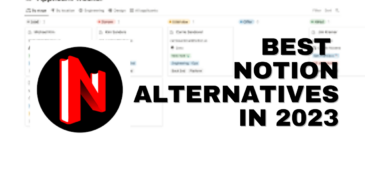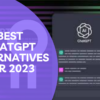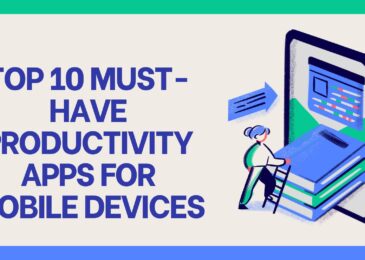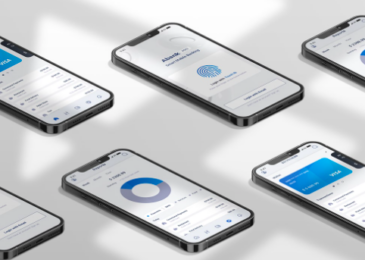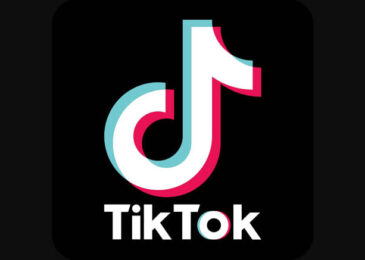As 2023 rolls around, the digital workspace landscape continues to evolve at a breakneck pace. With remote work becoming more of a mainstay than a temporary solution, the demand for versatile and powerful knowledge management tools is higher than ever. Enter Notion—a name that’s been on the lips of many, from productivity enthusiasts to corporate teams, offering an all-in-one workspace that promises to transform the way we manage information. But while Notion has been a game-changer for some, it’s not the one-size-fits-all solution many hoped it would be. Every organization, team, and individual has unique needs, and what works wonders for one might be a misfit for another.
In the expansive universe of digital tools, Notion might be the shining star that caught everyone’s attention, but it’s hardly alone in the galaxy. A constellation of equally, if not more, powerful alternatives have emerged, each with its own set of strengths, quirks, and unique selling points. Whether you’re a seasoned Notion user itching for a change or someone just dipping your toes in the knowledge management waters, 2023 is promising a buffet of choices. Dive into our comprehensive guide to discover the best Notion alternatives this year has to offer. Trust us; this is a journey you won’t want to miss.
What is Notion?
Notion is a sought-after productivity application designed to streamline and harmonize your company’s work processes. Here are its core features:
- Unified Workspace: Notion provides a consolidated workspace where teams can collaborate, capture ideas, and manage projects seamlessly.
- Kanban Board Interface: Through its clean kanban board design, Notion makes the creation, storage, and collaboration over detailed project documents straightforward.
- Document Sharing: Teams are granted flexibility with both public and private sharing options, ensuring that collaboration remains secure.
- Project Tracking: The app boasts built-in timeline views to monitor project progress. Users also have the liberty to create any custom view of their preference.
- Budgeting & Resource Allocation: Beyond document collaboration, Notion simplifies the process of tracking project budgets and resources.
- Search Capabilities: With robust search functionalities, documents are quickly accessible and systematically organized.
- AI-powered Capabilities: One of Notion’s standout features is its AI-driven assistance. It suggests relevant tasks and prioritizes them based on factors like urgency, importance, and deadlines. Moreover, if you hit a snag with a project, Notion’s AI note-taking assistant provides advice and resources for quicker completion.
Limitations of Notion
While Notion stands out as a versatile knowledge base platform, it isn’t without its shortcomings. These limitations might make users consider other alternatives:
Inadequate as a Project Management Alternative
- Notion intends to position itself parallel to dedicated project management tools. Yet, it falls short in delivering some of the quintessential features such tools possess.
- Features like built-in Gantt charts with dependency visualization, Goals and OKRs, and time tracking and estimates are notably absent in Notion.
Complex Customizability
- At the heart of Notion’s appeal is its vast customizability, allowing users to tweak docs per project requirements.
- Paradoxically, this strength can also be a drawback. The sheer depth of customization options can be overwhelming for newcomers. Moreover, the perpetual editing of documents by multiple users can disrupt the establishment of a steady workflow.
Limited Google Calendar Integration
- Despite portraying itself as a task management tool, Notion has a weak bridge with Google Calendar.
- It does permit users to embed a calendar. However, this calendar operates in a “view-only” mode, necessitating a switch to the Google Calendar app for any additions or modifications.
Best Notion alternatives in 2023
ClickUp
ClickUp is rapidly rising as one of the top-rated project management software worldwide. Distinguished from Notion due to its comprehensive project management capabilities, it offers features such as custom task statuses, assigned comments, and Gantt charts. It also possesses an integrated wiki tool termed ClickUp Docs. With AI features like ClickUp AI, users can enhance their writing, and the ClickUp Notepad is suitable for instantaneous note-taking. Though exceptionally beneficial, ClickUp still has limitations, especially regarding its mobile app views.
Key Features
- Customizability: ClickUp offers an extensive level of personalization, allowing users to adjust their documentation on a project-by-project basis. This means each project can have its unique setup, adapting to the particular needs of that project.
- AI-Powered: Incorporating AI technology, ClickUp assists users in content creation by offering real-time feedback on various aspects, including grammar, spelling, and overall content flow, ensuring the production of high-quality content.
- Notepad: Beyond just note-taking, ClickUp’s Notepad offers enriched text formatting, enabling users to seamlessly add checklists or intricate code snippets. It elevates the simplicity of jotting down ideas to a comprehensive documentation tool.
- Checklists: An essential feature for meticulous task management, ClickUp’s checklists offer nested items, an intuitive drag-and-drop mechanism, and the ability to assign specific list items to team members, ensuring a clear division of responsibilities.
- Views: Catering to the diverse operational preferences of teams, ClickUp offers various perspectives for tasks including board, list, and box views. This ensures everyone can work in the manner they find most efficient.
Pros
- Comprehensive project management features.
- Built-in Docs for integration.
- AI-Powered writing assistant.
- Versatile note-taking capabilities.
- Offers multiple project views.
Cons
- Limited mobile app views.
- Potentially steep learning curve.
- Not solely note-focused.
- Overwhelming feature variety.
- Limited calendar integrations.
Evernote
A long-standing favorite in the note-taking realm, Evernote stands out for its simplicity and cross-platform synchronization. Although comparable to Notion, Evernote’s core strength remains in note-taking rather than project management. It supports offline note-making and seamlessly integrates with tools like Asana. However, its free version is somewhat restrictive, particularly concerning storage.
Key Features
- Cross-Platform: Evernote is designed to offer an uninterrupted experience, enabling users to synchronize their notes seamlessly across various devices, be it mobile or desktop.
- Intuitiveness: Known for its straightforward design, Evernote’s user-friendly interface ensures that even beginners can quickly get the hang of it and start documenting their ideas effectively.
- Note Sharing: With the modern need to share content across platforms, Evernote facilitates easy sharing of notes to various social media platforms, broadening its utility.
- Speech-to-Text: Catering to the on-the-go user, Evernote can convert spoken words into written text, ensuring that no idea goes undocumented, irrespective of the user’s situation.
- Integration: In the interconnected world of software, Evernote holds its own by offering integration capabilities with other renowned project management tools, such as Asana.
Pros
- Seamless cross-platform syncing.
- Offers various note templates.
- Supports speech-to-text input.
- User-friendly interface design.
- Integrates with Asana.
Cons
- Limited project management features.
- Note storage restrictions.
- Primarily note-focused.
- Limited advanced integrations.
- Limited free version.
ProofHub
An integrated solution for project management and team collaboration, ProofHub offers more than just note-taking. With features like dedicated notebooks, multiple project views, and built-in chats, it presents an all-in-one work management solution. Its note-taking section is fortified with capabilities like commenting and file attachments.
Key Features
- Notes Section: ProofHub offers a dedicated notes area where users can organize their thoughts with topic-specific notebooks. This feature aids in keeping information categorized and easily accessible.
- Multiple Views: Addressing varied user preferences, ProofHub supports multiple project perspectives including boards, timelines, and table views, allowing tasks and projects to be visualized in different ways.
- Team Collaboration: Going beyond just task management, ProofHub incorporates built-in chat, discussions, and proofing. This ensures seamless communication and efficient collaboration within teams.
- Productivity Metrics: ProofHub isn’t just about managing tasks; it also offers time tracking and reporting features. This helps teams monitor their efficiency and adjust workflows accordingly.
- Notebook Organization: With the ability to store multiple notes under one notebook, ProofHub ensures that similar information is neatly aggregated and organized.
Pros
- All-in-one work management.
- Dedicated note-taking section.
- Offers multiple project views.
- Enhances team collaboration.
- Supports time tracking/reporting.
Cons
- No Google single sign-in.
- Needs better notifications.
- No dedicated desktop app.
- Limited third-party integrations.
- Absent AI capabilities.
Google Keep
For those who appreciate straightforwardness, Google Keep is a robust yet simple note-taking and to-do list app. While its mobile app is user-friendly, Google Keep lacks the dynamic capabilities of more comprehensive productivity apps, making it better suited for straightforward tasks and quick note jotting.
Key Features
- User-Friendly: Google Keep has a minimalist and intuitive design, making it extremely easy for users to jot down thoughts or compile lists swiftly.
- Syncing: Being a Google product, Keep seamlessly synchronizes across all Google devices, ensuring that your notes are accessible wherever you are.
- Labels: With the label grouping feature, Google Keep aids in organizing notes and ensuring that related information is clubbed together.
- Handwriting: The software allows handwritten notes, which is particularly useful for those who prefer a more personal touch or are using touch-based devices.
- Reminders: It isn’t just a static note-taking app; Google Keep has the functionality to set location and time-based reminders for notes, ensuring timely action.
Pros
- Simple, user-friendly interface.
- Seamless cross-device syncing.
- Supports handwritten notes.
- Location-based reminders available.
- Features automatic note saving.
Cons
- Less versatile, basic focus.
- No dedicated desktop apps.
- Lacks customizability themes.
- Poor project management functions.
- Simplistic note organization.
Workflowy
As a tool singularly focused on refining the note-making process, Workflowy offers an organized structure for documentation. Supporting deep nesting capabilities and a functional interface, it aligns closely with those needing a note-focused application. Nonetheless, its limitations in mobile web browsing might deter some users.
Key Features
- Rich Text: Workflowy offers an expansive text editing toolkit, enabling the creation of detailed and formatted documents.
- Nesting: With deep nesting capabilities, Workflowy ensures that complex ideas and projects can be broken down into detailed sub-points.
- Structured Interface: Workflowy presents a neatly structured and functional interface that emphasizes clarity and efficiency.
- Task Creation: Beyond notes, Workflowy supports the creation of tasks and projects, ensuring comprehensive documentation of workflows.
- Quick Syncing: The platform ensures rapid synchronization across devices, allowing users to access their information from anywhere.
Pros
- Structured, functional interface.
- Deep nesting for organization.
- Quick cross-platform syncing.
- Efficient user experience.
Cons
- Limited mobile web functions.
- Infrequent product updates.
- No open-source features.
- Mainly note-focused.
- Limited free usage.
nTask
nTask, a recognized name in task management, allows users to collaborate on projects, establish deadlines, and even set up a project-centric knowledge base. With features like checklists for task management and Gantt charts, it’s a good fit for teams looking to balance notes and project tasks. But the lack of a dedicated desktop app might be a drawback for some.
Key Features
- Checklists: nTask offers a robust system for creating checklists for task management. These lists ensure that every detail of a project is accounted for, and teams can systematically work through their responsibilities.
- Kanban Boards: With Kanban boards, workflows can be visualized and managed more effectively. This visualization helps teams understand task progression and bottlenecks, streamlining project processes.
- Time Tracking: Essential for assessing productivity and for billing purposes, nTask’s time tracking and timesheet reporting tools provide insights into how time is being allocated and spent across tasks.
- Gantt Charts: Gantt charts in nTask provide a visual timeline for projects, assisting teams in understanding the sequence of tasks, their interdependencies, and the overall project trajectory.
- Collaboration: nTask has been designed as a comprehensive collaboration platform. Beyond simple task assignment, it supports risk management and facilitates online meeting management, ensuring that teams remain interconnected and informed.
Pros
- Enables easy team collaboration.
- Supports risk management.
- Offers online meeting management.
Cons
- No dedicated desktop app.
- Limited customization options.
- Poor customer support.
- Lacks milestone tracking.
- Limited third-party integrations.
Microsoft OneNote
Microsoft’s very own OneNote aims to combine collaborative documentation with note-taking. Its integration with other Microsoft products, a rich text editor, and an array of font options ensure a versatile platform for users. However, the mobile app interface might feel a tad crowded for some.
Key Features
- Unified Interface: OneNote integrates seamlessly into the Microsoft ecosystem, providing a consolidated platform for note-taking, documentation, and collaboration. Its synchronization with other Microsoft products ensures a consistent user experience.
- Customizable Themes: Catering to individual preferences, OneNote offers multiple themes for enhanced customizability, allowing users to tailor their workspace to their liking.
- Advanced Editor: Beyond just simple notes, OneNote’s powerful text editor supports multimedia elements, including audio clips, screen clippings, and even handwritten notes, making it versatile for diverse note-taking needs.
- Note Encryption: Security is paramount, and OneNote ensures data protection with its flexible note encryption capabilities. This feature safeguards sensitive information and provides peace of mind to users.
- Organized Folders: Efficient data retrieval is essential, and OneNote facilitates this with its organized folder system. Notes can be categorized, labeled, and stored systematically, ensuring they are easily accessible when needed.
Pros
- Seamless Microsoft integration.
- Rich text and media support.
- Extensive font and customization options.
- Simple note sharing capabilities.
Cons
- Congested mobile app interface.
- Limited project management.
- Can’t auto-sort notes.
- Mainly note-focused.
- Possibly non-intuitive UI/UX.
monday.com
A comprehensive task management tool, monday.com is tailored for those who want a visually appealing and intuitive workspace. From customizable platforms to task automations, it’s designed to streamline workflows. Yet, it does have some limitations, such as restricted comment assignments.
Key Features
- Templates: monday.com offers ready-to-use templates that save time and provide a standardized workflow, ensuring a quick start for teams to get their projects up and running.
- Integrations: It seamlessly integrates with various other productivity tools like Google Drive, Outlook, and Slack, ensuring that teams can work in a unified environment with all their favorite tools.
- Automations: Customizable automations in monday.com allow teams to set specific triggers and actions, reducing manual repetitive tasks and making processes more efficient.
- Custom Dashboards: Users can design their dashboards to reflect the metrics and details they care about most, ensuring a personalized experience when reviewing project progress.
- Multiple Views: Providing flexibility in project visualization, monday.com supports different perspectives such as calendar, timeline, and workload, catering to different team preferences.
Pros
- Ready-to-use workflow templates.
- Allows customizable task automations.
- Multiple project view options.
- Effective Gantt chart visualization.
Cons
- Can’t assign comments.
- Limited free plan features.
- Potentially overwhelming for newbies.
- Limited note-taking features.
- Might have higher costs.
Coda
Coda emerges as a comprehensive tool integrating word-processing, spreadsheets, and database management. Acting as a bridge between tools like Notion and advanced database solutions, it promises a unique and customizable experience. However, its pricing and lack of a dedicated desktop app may deter some users.
Key Features
- Unified Platform: Coda integrates powerful word-processing, spreadsheet capabilities, and database functions all under one roof, making it a versatile tool for various documentation needs.
- Integrations: Coda easily integrates with a plethora of other applications, making it adaptable to different workflow ecosystems.
- Customizable Views: Every team has its unique workflow, and Coda’s customizable views ensure that every project can be visualized in a way that mirrors its workflow.
- Templates: With a broad collection of templates, Coda speeds up the process of setting up new projects or documents, allowing teams to get started swiftly.
- Pricing Flexibility: Coda offers a broad range of pricing options, including a free tier, ensuring it’s accessible to teams and individuals of all sizes.
Pros
- Combines word-processing and spreadsheets.
- Offers customizable views.
- Extensive template collection.
- Facilitates easy task automation.
Cons
- Limited free version capabilities.
- No dedicated desktop app.
- Pricier than Notion.
- Steeper learning curve.
- Potentially too complex.
Asana
Asana is geared towards teams eager to clarify responsibilities and streamline coordination. It offers the ability to break down plans, define goals, and even integrate with preferred productivity tools. While offering vast capabilities, new users might find its interface a tad overwhelming.
Key Features
- Task Definition: Asana stands out by allowing users to break overarching goals into smaller, actionable tasks, ensuring clarity and a clear path to completion.
- Integrations: With over 100 integrations, Asana effortlessly blends into an existing workflow ecosystem, reducing the friction of adopting a new tool.
- Timeline View: The Gantt chart-inspired timeline view in Asana offers a visual representation of a project’s progression, making it easier to plan, track, and manage projects.
- Milestones: The ability to set milestones helps in identifying key phases or crucial tasks within a project, ensuring that teams recognize and work towards pivotal moments.
- Privacy Options: Asana ensures data security and discretion with features like private and comment-only projects, safeguarding sensitive information.
Pros
- Clear task addition and assignment.
- Allows rule definition for automation.
- Gantt chart creation for visualization.
- Milestone tracking for projects.
Cons
- Can’t set multiple assignees.
- Limited free version.
- Potentially overwhelming UI.
- Excessive features for some.
- Less modern UI/UX.
Basecamp
All about making project management simple, Basecamp promises a holistic platform to track progress, manage documents, and facilitate effective team communication. While it offers a straightforward approach to tasks, it does lack customization options for more intricate projects.
Key Features
- All-in-One Platform: Basecamp serves as a one-stop solution for project management and team collaboration, integrating task tracking, document management, and communication.
- Document Space: It provides dedicated space for sharing documents, files, and images, ensuring all project-related assets are centrally located and easily accessible.
- In-Built Calendar: Planning and scheduling become seamless with Basecamp’s integrated calendar, ensuring teams are always aligned with deadlines.
- To-Do Lists: Detailed to-do lists with due dates ensure tasks are well-defined, prioritized, and tracked to completion.
- Hill Charts: A unique feature, Hill Charts provide a visual representation of work progress, offering insights into tasks’ current stages.
Pros
- Simplifies task management.
- Organized message board for communication.
- Client access for transparency.
- Supports email forwarding for discussions.
Cons
- Limited project customization.
- Can’t set task priorities.
- Can’t define task statuses.
- Too simplistic for some.
- Lacks AI capabilities.
ProProfs
Project Promising a straightforward task management system, ProProfs Project stands out for its real-time tracking capabilities. With features like interactive project views and task alerts, it keeps users updated. However, there are certain features like milestone tracking that are conspicuously missing.
Key Features
- Interactive Views: ProProfs Project offers visual project views that make it easier to monitor task progress and team contributions.
- Automation: Recurring tasks can be set to auto-mode, ensuring consistency and saving time.
- Real-Time Alerts: With task alerts and notifications, users are always updated about task updates or changes.
- Collaborative Comments: Enhancing teamwork, task comments allow easy collaboration, feedback sharing, and discussion within the platform.
- Intuitive Interface: Designed for usability, ProProfs Project boasts a user-friendly interface that ensures easy navigation and efficient task management.
Pros
- Interactive project view options.
- Automated recurring tasks.
- Customizable quick workflows.
- Intuitive user interface.
Cons
- No milestone tracking.
- Poor mobile application.
- Missing file manager.
- Limited third-party integrations.
- Potentially outdated UI/UX.
Obsidian
A fresh face in the note-taking world, Obsidian introduces a distinctive constellation view for its knowledge base. While it offers a playful approach to documentation, it might have a steep learning curve, especially for those venturing past basic note-taking.
Key Features
- Plugins: With over 20 plugins, Obsidian supports various functionalities like templates, bi-directional linking, and markdown conversion, enhancing its core capabilities.
- Graph View: Offering a unique visualization, Obsidian showcases your notes in a constellation or graph view, providing insights into how your ideas interconnect.
- Markdown Support: Catering to tech-savvy users, Obsidian supports both CommonMark and GitHub Flavored Markdown, making it versatile for different documentation styles.
- Lightweight: Obsidian offers a lightweight interface, ensuring that it remains swift and responsive, irrespective of the volume of data.
- Pricing Model: Being free for personal use, Obsidian ensures that individuals can access its powerful features without financial barriers.
Pros
- Unique graph view for files.
- Supports unlimited knowledge creation.
- Lightweight and free to use.
Cons
- Needs third-party plugins.
- Vault not shareable.
- Steep learning curve post-basics.
- Less project management focused.
- Graph view is impractical for some.
Also read:
Best ChatGPT Alternatives for 2023
Advantages of online planners above paper planners
List of Best TikTok Proxy Apps: August 2023 (Updated)
FAQs
Why are people seeking Notion alternatives in 2023?
While Notion is a robust note-taking app, it lacks advanced task management functionalities and can be challenging for novice users. Thus, teams seek alternatives for comprehensive project management and a smoother user experience.
Which Notion alternatives offer AI-powered capabilities?
ClickUp is one of the notable Notion alternatives that has AI-powered capabilities to prioritize tasks and assist in note-taking.
Are all Notion alternatives paid, or do some offer free plans?
Many Notion alternatives like ClickUp, Google Keep, Microsoft OneNote, and Obsidian offer free plans, while others have both free and paid options with varying features.
Which Notion alternatives are best for comprehensive project management?
ClickUp, ProofHub, monday.com, and Asana are especially tailored for comprehensive project management with multiple features to assist teams in handling projects efficiently.
Are Notion alternatives suitable only for larger teams, or can individuals use them too?
While many alternatives cater to team needs, they also offer features and plans suitable for individual users. Tools like Evernote, Google Keep, and Microsoft OneNote are particularly popular among individuals for note-taking and organization.
Conclusion
In the ever-evolving digital landscape of 2023, Notion has cemented its place as a commendable productivity application, streamlining knowledge management and collaboration for teams around the globe. Its ability to unify various work processes under a single roof is undoubtedly laudable. But as the proverb goes, “One size does not fit all.” Notion, despite its multifaceted nature, presents certain limitations, especially when catering to more intricate project management needs or larger teams. The extensive customization, while powerful, can sometimes be its Achilles heel, overwhelming novices and creating inconsistency in workflows. Furthermore, its lack of complete synchronization with tools like Google Calendar underscores the gaps in its offerings.
On the brighter side, 2023 has ushered in a plethora of alternatives, each with its unique set of features tailored to bridge the gaps left by Notion. Tools like ClickUp stand out, bringing comprehensive project management capabilities right to your fingertips. With AI-enhanced features, customizable docs, and a user-friendly interface, it’s the go-to for many. Then there’s Evernote, the veteran in note-taking, and newcomers like Obsidian, offering fresh, intuitive ways to handle notes. The vast variety ensures that teams, regardless of their size or nature, will find a tool that aligns with their specific requirements. So, while Notion continues to be a formidable player in the market, it’s heartening to see a buffet of robust alternatives available, ensuring everyone finds their perfect digital workspace match!


